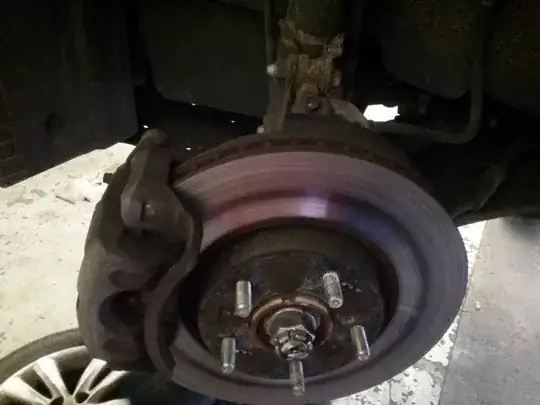I went to pep boys because i heard squealing and my pads were worn down. he also told me that i needed to replace my rotors so not knowing anything i did but i asked them tog ive them to me so i could make sure they were not screwing me over and they did. i had 2 mechanics look at them and they said they did not need to be replaced yet. can you guys look at them and tell me if i have been taken?
- 32,976
- 22
- 150
- 267
- 71
- 1
- 2
3 Answers
The only way to know if a rotor needs to be replaced is measuring it with a micrometer and comparing that to the manufacturers specifications, so, no, we can't tell you if it needed to be replaced.
However, since this was your first brake job I seriously doubt they needed to be replaced. Common practices is to "turn" rotors when doing a brake job. The turning process is putting it into a special machine that cuts off the surface layer of the disk, creating a smooth surface again. This normally removes only a very small amount of material and rotors can usually be turned several times.
If you let the brakes go so far that the metal backing of the brake pads made huge grooves in the rotor, they may not be turntable, but other mechanics said they were ok, so that's not the case. Also, if the rotors were warped (steering wheel shaking while braking, so you would know if they were warped), then sometimes they can't be turned and will have to be replaced. Well, you can turn them, but they can quickly re-warp.
So, in summary, I'd ask the service manager why they needed to be replaced, because with the limited information available, I don't see a need (and more importantly, neither did the other mechanics that you asked in person -- I'd trust them over me, but this "technical" explanation is probably helpful as well).
- 13,266
- 4
- 40
- 81
You cannot tell from just looking at them (in most cases) ... you have to measure the thickness of the rotor to see if they need replaced. Also, it's hard to tell from the picture how deep the wear is on the rotor. The grooves could be 1mm deep, or 5mm deep ... it's really hard to tell. It really comes down to how thick the rotors would be after machining.
To assuage your fears a little, most times it is only just a little more expensive to replace the rotors than to have them machined. Replacement with brand new is not a bad thing most of the time. If I do them myself, I will almost always replace over machining, just because of the time it saves me from having to take it to a shop. Since you were already at the shop, that factor isn't there.
- 165,084
- 32
- 259
- 508
Squealing can be caused by a pattern of grooves in the rotor that make it look like an old vinyl record. The thickness of the rotor makes no difference on squealing, so even if there was plenty of meat left on the rotor it still needed servicing. Depending on how thick the rotors were you might have been able to machine them instead of replacing them - but sometimes the cost is the same so you might as well stick with new.
Mechanics dread customer complaints about squealing brakes and many professionals will do the pads and rotors at the same to best eliminate the probability of squealing.
I just did my brakes and only replaced the pads and this resulted in squealing. I had to go back and replace the rotors to eliminate the squealing.
If you go back to the mechanic who said the rotors were fine and told him the problem was squealing he would likely tell you to replace them.
- 158
- 5